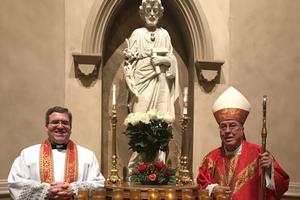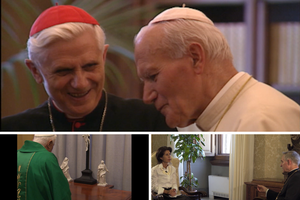Bishop Emeritus Foley of Birmingham Dies at 88
Prelate recalled as ‘wonderful shepherd’ who was devoted to the Blessed Sacrament.

BIRMINGHAM, Ala. — Bishop Emeritus David Edward Foley, the third bishop of the Diocese of Birmingham, Alabama, died peacefully Tuesday evening. With friends gathered around him, the 88-year-old bishop passed away at 7:01pm in St. John Vianney Residence for Priests in Birmingham.
“All of us at EWTN are saddened by the death of the Most Rev. David Foley, who served the Diocese of Birmingham as bishop for over a decade,” said Michael Warsaw, chairman and CEO of EWTN Global Catholic Network. Warsaw said he had “the privilege of first knowing Bishop Foley 30 years ago, when he was a pastor in the Archdiocese of Washington. Throughout his life and wherever his service to the Church took him, he was always known for his keen intellect, pastoral sensitivity and powerful preaching.”
During the time he was bishop of Birmingham, Bishop Foley served as a member of the EWTN Board of Governors.
Birmingham’s Bishop Robert Baker noted that Bishop Foley died on the anniversary of the death of Cardinal Francis George, whose funeral he had attended.
“In many ways, Bishop Foley was like him, a great man, a great Christian and a great Churchman, so devoted to his people and his ministry as priest and bishop,” observed Bishop Baker.
He witnessed how Bishop Foley’s death “culminated a life totally given over in service to God and the People of God. One could say that he literally died with his boots on! He had been in active ministry, celebrating Masses right up to the end.”
An official statement from the Birmingham Diocese detailed how Bishop Foley’s retirement was in name only. Being a priest was the true love of his life. “He would spend Christmas and Thanksgiving at prisons, celebrate Mass for any priest for any reason in any parish at any time, and would regularly help with confirmations. Always humble, he quietly continued … visiting the sick in hospitals each week and celebrating Mass once a week for the elderly unable to travel.”
Deacon Terry Rumore of the Birmingham Diocese said, “What more can you ask of a shepherd? He was a wonderful shepherd. The Pope said to have the smell of the sheep, and that’s what he did.”
Deacon Rumore, who was ordained by Bishop Foley, remembered how he had led the diocese in “a wonderful way” and how as a bishop emeritus he assisted Bishop Baker by going to all the parishes, such as “helping out with the Tridentine Mass at Blessed Sacrament Church. He was incredibly wonderful, as far as a man and a shepherd.”
Early Life
David Edward Foley was born Feb. 3, 1930, in Worcester, Massachusetts, the son of George F. and Ellen Vincent Quinn Foley. At age 4, he moved with his parents and two older brothers to Washington, D.C., when his father was appointed assistant attorney general of the United States. Bishop Foley was preceded in death by his father, mother and two older brothers, George V. and William.
After eighth grade, he entered St. Charles College minor seminary in Cantonsville, Maryland, and proceeded in 1950 to St. Mary’s Seminary in Baltimore, receiving a licentiate in sacred theology in 1956. He was ordained a priest for the Archdiocese of Washington May 26, 1956, in St. Matthew’s Cathedral. After serving in parishes for 30 years, Pope John Paul II appointed him auxiliary bishop of the Diocese of Richmond, Virginia. He was consecrated June 27, 1986.
On March 22, 1994, John Paul II appointed Bishop Foley the third bishop of Birmingham. He was installed May 13, 1994.
At age 75, Bishop Foley retired May 10, 2005, and was immediately elected diocesan administrator until the appointment of his successor, Bishop Baker, in 2007.
During his time leading the Birmingham Diocese, Bishop Foley also “took great joy” in hosting Pillars of Faith, said Warsaw. The originally weekly live call-in television program examined the Catechism of the Catholic Church from cover to cover right after the English edition of the Catechism was released.
“As host of the new program, Bishop Foley became one of the most recognized bishops in the world,” wrote Raymond Arroyo in his biography of Mother Angelica.
As for their relationship, Warsaw noted: “Despite their occasional disagreements, when Mother Angelica suffered her stroke and brain hemorrhage in 2001, Bishop Foley was one of the first to be at her bedside, and he remained a frequent visitor to pray for her. He never wavered in his respect for all that Mother had accomplished and was always supportive of the network she founded.”
Active to the End
On Feb. 25, after Bishop Foley had celebrated two Masses at St. Patrick’s in Adamsville, he phoned Bishop Baker to say he was going to St. Vincent Hospital’s emergency room because he was experiencing shortness of breath and back pain. Bishop Baker met him there.
Tests at the hospital discovered that Bishop Foley had a very rare form of cancer that originated in bone marrow precursor cells that was highly aggressive and unresponsive to chemotherapy. Many did not know Bishop Foley had previously been undergoing continuous treatment for six months for an uncommon malignancy called Waldenstrom’s macroglobulinemia.
“After prayer and consultation, he decided to forego any further cancer treatment, as there was no hope for a cure,” recounted Bishop Baker. “His spirit remained positive because of his deep faith, which was an inspiration to all who were to visit him in the days ahead.”
True to character, he spent his days saying “Thank you” to everyone.
Bishop Foley decided he would spend his final days at St. John Vianney Residence for Priests with Father Joseph Underwood and Bishop Baker, who emphasized, “How blessed we were by his presence! He gave to us more spiritual support than we gave to him. We were able to celebrate holy Mass together in our residence chapel.”
When Bishop Baker couldn’t join him, Father Greg Bittner or a classmate of Bishop Baker’s from his seminary days celebrated Mass with Bishop Foley and “were a great source of pastoral care to him.”
The “stream of relatives and friends” who saw him “came away renewed in their faith by their visits,” observed Bishop Baker. He was very grateful for the many visits and for the letters and prayers of so many, as well as for his wonderful caregivers.
Shortly before he died, Bishop Foley wrote to his family in Christ, “Our Lord Jesus Christ has blessed me through you in the outpouring of love: cards, Mass cards, enrollments in Mass associations, spiritual bouquets, visits, phone calls and other kinds of gifts, messages and greetings.
“I feel a great desire to respond individually to you. This is just not possible.
“My illness progresses with some suffering and inconvenience. I am grateful for the loving and skillful care I receive. Memories of my years brings me happiness and some tears. I am able to spend much time before Our Lord in the Blessed Sacrament. You are there with me in my prayers.
“May the Lord Jesus Christ bless you and your family always.”
A Priest’s Priest
Deacon Rumore was one of those regular visitors, as was his family. “Even in the last days, he wanted friends to come and visit him. He wanted to talk to people. He told my children he was reading the book Preparation for Death by St. Alphonsus Ligouri. He kept asking us to ‘Please keep praying for me, even after I leave this earth.’”
He was a priest’s priest, said Deacon Rumore, who also remembers his devotion to the Blessed Sacrament in a chapel close to his room, where he spent much time before Our Lord.
“He had a wonderful sense of humor,” Rumore also recalled. “He loved the little ones; he loved children.” Bishop Foley enjoyed talking with Rumore and his wife Rita’s several grandchildren, always interested in how they were doing, and always trying to foster vocations.
The deacon will use the witness of Bishop Foley in his homily for Good Shepherd Sunday. “He was a prime example of a good shepherd. He had the heart of a shepherd. He was a short man in stature and a big man in everything else.”
At EWTN, Warsaw concluded prayerfully, “May God reward him for his life of service to the Church, and may he rest in peace.”
Bishop Baker reminded the faithful that, as we are still in the Easter season, “Let us rejoice, as Bishop Foley would want us to rejoice with him, in the victory our Lord Jesus Christ won for him and for all his faithful followers.
“Thank you for the beautiful example of your life, Bishop Foley, and the great testimony you have given to us by your death, of your faith in the resurrection of Jesus!”
Joseph Pronechen is a Register staff writer.
Funeral Arrangements
Bishop Foley’s body will be received at the Cathedral of St. Paul, 2120 3rd Ave., North, in Birmingham, on Sunday, April 22, at 2pm.
Following reception of the body, prayers will be held on the hour until 6:30pm. The Rosary will be begin at 4pm, led by Father Kevin Bazzel. At 6:30pm, Bishop Robert Baker of the Birmingham Diocese will preside over the vesper service, with Abbot Cletus Meagher of St. Bernard Abbey preaching.
The Mass of Christian Burial will be celebrated Monday, April 23, at 11am, at the Cathedral of St. Paul. Archbishop Thomas Rodi of the Archdiocese of Mobile will preside. Burial will immediately follow in the Cathedral of St. Paul courtyard.
Memorial contributions may be made to the Seminary Education Fund, Diocese of Birmingham, P.O. Box 12047, Birmingham, AL 35202-2047.

















